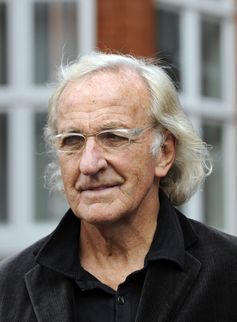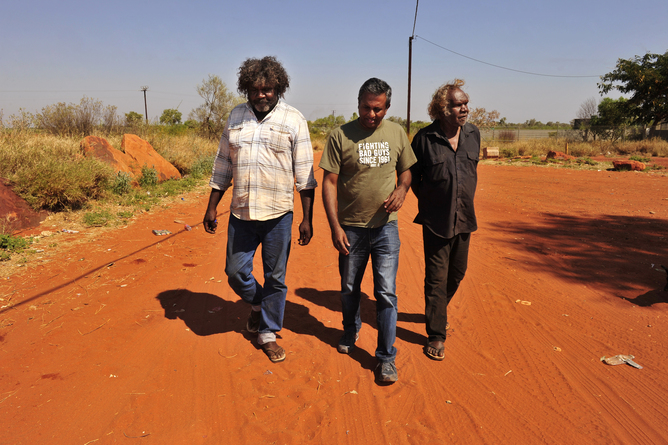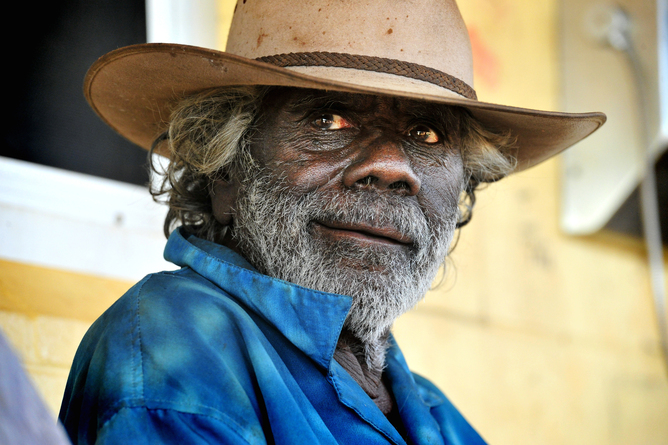Welcome to Aboriginal Australia in the 21st Century – John Pilger’s Utopia.
Posted on January 31st, 2014
Dr Marcus Waters
It was more than two decades ago when I saw John Pilger’s 1986 documentary The Secret Country for the first time. I was a 17-year-old Aboriginal male suffering the indignity of public housing Australia. My identity came with a sense of collective oppression that turned my indignity into both resistance and motivation.
Such feelings of resistance became an empowering experience that lead to a pursuit of justice identified through education. Now, almost 30 years later, I find myself part of the middle class. I own my house. My children have all attended private schools and it is easy to believe that things are improving.
I have John Pilger and his latest documentary Utopia, which premieres in Australia today, to remind me that it hasn’t.
Back to Utopia
Pilger first visited the Aboriginal community of Utopia in Central Australia 28 years ago during the making of The Secret Country.
He returned in 2013 to film Utopia to find things hadn’t improved. Families live in third-world conditions, in poorly sanitised shacks where they are plagued by easily curable diseases. Extended families of 16 to 20 people living in the one house – identified by government officials as an asbestos hazard.
This is Aboriginal Australia now: the most abject poverty you can imagine in one of the wealthiest countries in the world.
The film documents failed health policies and a number of very suspicious Aboriginal deaths in police custody. Pilger interviews several government officials to find out what went wrong – none of whom is willing to take responsibility.
http://utopiajohnpilger.co.uk/trailer
Trailer for John Pilger’s Utopia.
The biggest difference between Pilger’s two films is that The Secret Country was about Australia’s dark untold past whereas Utopia is about the present. The here and now is revealed to be inhuman, disgraceful and embarrassing.
It’s a point made in one of the interviews in the film with the Secretary General of Amnesty International. Salil Shetty asks why one of the richest countries in the world can’t solve the problem of Indigenous poverty. If it’s not about resources, the problem must lie “somewhere else”.
Somewhere else
It’s that “somewhere else” that sparked my interest in this film.
The film highlights that trachoma, a bacterial infection of the eye, among our mob is among the highest in the world. Our people are still being imprisoned at 10 times the rate of black people in South Africa under apartheid. Suicide rates within our communities are getting worse.
Hard to believe when we all love Cathy Freeman, Jonathan Thurston and Jessica Mauboy as much as we do. That’s what Pilger does, and he’s been doing it for a long time. His films remind us who we really are – and not everyone likes it.
The truth is that many of our communities are on mineral-rich lands that cause mouths to water in corporate and government boardrooms. I wish it was something more insidious, deeper or meaningful – but that’s it … power and greed.
False, cruel claims
The shocking conditions documented in Utopia are contrasted with the false claims made by the media and government about paedophile rings, petrol warlords and sex slaves in Aboriginal settlements.

Utopia looks at the story of a senior government Indigenous advisory official who told the ABC’s Lateline in 2006 that he was a former* youth worker in Indigenous communities in Central Australia and gave evidence about petrol warlords, paedophile rings and sex slavery.
The interview was big news and paved the way for the 2007 Intervention. After the interview was broadcast it was revealed that the man interviewed was Gregory Andrews, a branch manager for the then minister for Indigenous affairs Mal Brough’s Office of Indigenous Policy and Coordination.
Writing as an Aboriginal person who grew up in this country I have often heard that the poverty and despair I found myself in was all our own doing – therefore such accusations are nothing new. Still, the accusations of paedophile rings has really hurt. I say that as a father who loves his gaaynggal (children) very much.
The 2007 Northern Territory Intervention was initiated by the Howard government on the pretext that paedophile gangs were operating in Indigenous settlements. Troops were sent in; townships were compulsorily acquired and native title legislation ignored. Yet no prosecution for child abuse resulted, and studies concluded that there was no evidence of any systematic child abuse.
Apart from the crowd
Pilger than takes us to Rottnest Island, used as recently as 1931 as a concentration camp for Aboriginal people. Filming occurs in a former prison cell where 51 people were held before their execution. The cell has now been converted into a suite within a luxury hotel and spa complex.
There are hundreds of Aboriginal graves of people killed on the island.
Could you imagine a holiday resort being built over the remains of the Auschwitz Nazi concentration camp?

Mining companies have drawn big profits from the Northern Territory’s substantial oil and gas reserves over the past decade. They’ve been criticised for not sharing their wealth with Indigenous people. The ongoing implementation of the Northern Territory Intervention ensures communities such as Utopia will never see the benefits of this boom.
What can I say – other than welcome to the travesty of Aboriginal Australia in the 21st Century.

January 31st, 2014 at 3:27 pm
A classic case of an enormous violation of the basic rights of an entire race. The Aboriginal people of Africa form an entirely independent race. Of the races stated which include the Caucasoid race, the Negroid race, the Mongoloid race… and the Australoid race. The last being the remnants of the aboriginals of Australia.
What we are witnessing is the deliberate extermination of a race. This is more heinous than human rights or crimes against humanity, it is genocide authorized by the government and sanctified by the new immigrants. Of all the human rights crimes the plight of the aborigines should take front and center in the UNHRC. I would like to list the members of the current UNHRC:
Members of the UNHRC are Algeria, China, Congo, Cuba, Ethiopia, Gabon, Vietnam, Kazakhstan, Russia, Saudi Arabia, United Arab Emirates, Burkina Faso, Ivory Coast, Kenya, Kuwait, Macedonia, Maldives, Mexico, Morocco, Pakistan, Philippines, Venezuela, Argentina, Austria, Benin, Botswana, Brazil, Chile, Costa Rica, Czechoslovakia, Estonia, France, Germany, India, Indonesia, Ireland, Italy, Japan, Montenegro, Namibia, Peru, South Korea, Romania, Sierra Leone, South Africa, United Kingdom and United States of America.
February 1st, 2014 at 4:35 am
How true. I feel truly sorry for those aborigines where their land is stolen but the invaders days will be numbered when China gives her attention.